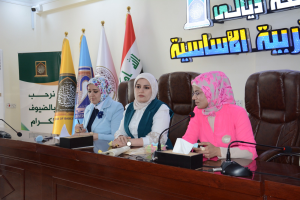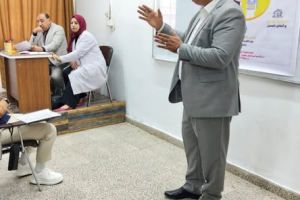
Diyala leads health awareness in Pink October
A scientific step to save society through a seminar and voluntary breast cancer screening
As part of Pink October activities to raise awareness about breast cancer, the Faculty of Basic Education, in collaboration with the Diyala Health Department and the Volunteer Work Unit – Student Activities Division and Science Department, and in coordination with the Continuing Education Division and the Media and Government Communications Division, organized an awareness seminar entitled “Breast Cancer: Prevention and Early Treatment: A Step Towards Saving Society,” as well as providing free voluntary screening for female students and participants in the seminar.
The seminar, which was moderated by Dr. Nourus Najib Ahmed and presented by Dr. Rola Essam Mahdi from the First Al-Khalis Health Center, aimed to educate female students about the importance of early detection of breast cancer and raise health awareness about this disease and its impact on society.
The seminar included a discussion of several key topics, including: what breast cancer is and its definition; the prevalence of the disease and its impact on public health; the importance of early detection to reduce complications; the benefits of early screening on the lives of those affected and prevention; and free voluntary screening for seminar participants by Dr. Rola Essam Mahdi.
The Dean of the College, Assistant Professor Dr. Ayman Abdul Aoun, praised this voluntary and awareness-raising initiative, emphasizing its role in promoting public health and preventing chronic diseases. For their part, the participating faculty members and students expressed their thanks and gratitude to Dr. Mahdi for her awareness-raising efforts and early screening, which contributed to raising their health awareness.
This seminar is part of the college’s efforts to achieve the Sustainable Development Goals (SDGs), particularly Goal 3: “Good Health and Well-being,” which emphasizes promoting public health and encouraging prevention and early detection of diseases to ensure a healthy life for the university and local community.


![]()



